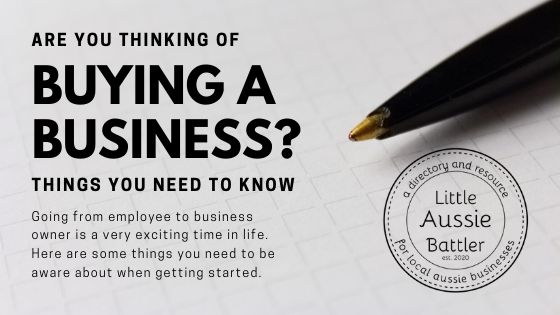With so much uncertainty in Australia and around the world it brings questions about whether now is a good time to invest, start a business or buy a business. At the moment we are faced with a world pandemic, a recession topped off with a new lifestyle of isolation and social distancing. The world we live in is a very different place right now. Having said that, many see opportunities in times like this beyond the hard times to set themselves up for their future whether it’s for financial or personal goals.
With many businesses either closing down or reconsidering their future for various reasons, it gives opportunity for investors, business owners looking to expand or individuals wanting to get into business opportunities to consider purchasing a business. Here are some important points that you should know when buying an existing business to make a well informed decision.
[Disclamer: This is for general information and is not advice and does not take into account specific situations of the reader]
Table of Contents
Why do you want to buy the business?
What is your driver and motivation? Are you simply looking to buy yourself employment? Are you passionate about the industry? Do you have sound management skills?
If you have not owned a business before, it may be a shock how many new skills you need to learn to carry on a business and the importance of keeping on top of certain tasks. Of course you can also hire people do take care of certain aspects but you still need to be in control and understand what’s going on. If you are a hairdresser working for a salon and suddenly become the owner, you are now responsible for the rent, the booking system, marketing, accounting, wages, taxes, GST, bills, inventory, supplier relations. All of a sudden you need to be aware of how much the fee is for taking that customers credit card payment and whether it’s economical to your business. It’s all a part of the package of owning a business.
So you’ve Found A business
You’ve been looking high and low, online, in person, maybe you’ve been talking to a broker. You find the business that you’re interested in and it’s time to really understand what you’re getting yourself into. When you buy a house, you need to understand what council rates, water, gas, emergency services levy to expect. If you’re buying a car, new or second hand, you would consider how much it costs to service and maintain, maybe even cost of replacing tires and how many kms to the liter of petrol. Why would you overlook this for a business? Here’s some things you should know and look out for.
Why are they selling the business?
You are allowed to ask why someone is selling their business just like any large purchase whether it be a house or a car, there are many reasons why business owners sell. It could be because they are retiring and don’t have a succession plan, they could be relocating, or maybe they became tired or were not good at managing the business.
What Are You Buying?
You need to understand the scale of the business and what you are buying into. Here’s some basic scenarios to consider:
- Is this a small business that’s owner operated with no one else involved?
- Is this a part of a larger business structure that you are buying? e.g. A large company that is selling one part of their operations or maybe a franchise operation.
- Are you buying the total business or shares in the business whether some or all?
The Asking Price & Is it Worth It?
There’s a market value, there’s the owners perceived value and there’s the value that you are willing to pay for the business. There are different ways to consider a businesses value but if you aren’t sure then it is highly recommended to seek professional advice usually from your accountant. Apart from the obvious bottom line, you need to understand the ‘goodwill’ that has been factored in as well as any tangeable assets that you are acquiring as a part of the purchase.
What Comes with the business?
No two business transactions are the same. There may even be subtle differences between two different franchises under the same brand. You need to be alert or might not even know of some of these things to consider especially if you are newer to the game:
The Operating Premises / The Lease
What are the terms of the lease?
You need to understand whether you will carry on the existing lease and the terms of the existing lease or whether you will enter into a new agreement with the landlord or even if the landlord intends on renewing the lease. You could end up buying a business with no property to operate from in the near future.
Is the Rent Going Up?
If the rent is going up, whether a small amount or significantly, you need to consider these things when making your decision. If a business is showing a breakeven bottom line figure and the rent is going up $1,000 per month, that’s $12,000 per annum less to the bottom line (on the assumption that you can also maintain or improve on the current turnover).
Is a Bank Guarantee Required?
To secure a lease it is common to provide a bank guarantee and you wouldn’t believe how often this is overlooked, forgotten or considered insignificant. In some cases issuing a bank guarantee is quite straight forward at the bank but a process is still involved so don’t expect the bank to drop everything to issue you a bank guarantee document just because you didn’t get organised. For some people wanting to secure a bank guarantee against property, this can be a timely process sometimes with new mortgage documents required so don’t get caught out and get prepared.
Liabilities & Expenses
When buying a house or a car, if there is finance by the vendor it is usually expected that the asset is transferred to you unencumbered but when it comes to business, while this is often the case for small business transactions, there could be some liabilities to consider.
Plant and Equipment
There may be finance or leasing arrangements on some plant and equipment. If this finance is not paid out then you don’t get the plant and equipment. You might be expected to take over the remaining debts (if the financier approves). This is up to you to negotiate and or organise with the vendor but you need to be aware.
Employee Entitlements
Are all employee entitlements up to date? Don’t forget long serving employees are also entitled to long service leave which you will take on the financial burden when they become your staff. Remember it might look like an expense but a loyal employee has helped to bring a business to where it is today. Understanding employee entitlements may help you to understand why you may be offered a good price for the business or may give you some bargaining power.
Stock At Valuation (SAV)
When you buy a business, you may have a purchase price +SAV. If this is the case then you need to understand what you would be up for at settlement and it can be a double edged sword. If you’re in a business with quick turnover of stock and you organise with the vendor for next to no stock at settlement, you still need to replace what’s needed which means the related expense will creep in very quickly.
Information You Should Get Straight Up
When a business is up for sale, there’s usually a couple of common things that are provided depending on the business being sold. There’s three really common scenarios that I’ve seen in years of dealing with businesses acquisition transactions for small & SME businesses:
- Form 2 – The Form 2 is basically a business sale template where much of the information related to the sale is laid out. It also includes 3 years worth of financials where you can see the bottom line and other pieces of important information relating to the business operations. This is information is quite commonly provided when a business is up for sale.
- Information Memorandum (IM) – This is a more in depth report compared to the Form 2 where more information is presented in a larger report style memorandum with more information about the operations and intricacies of the business being proposed for sale. Similarly they will show some historical performance results and is a great starting point for you to research your options.
- No Information – This scenario kicks in more often than you could imagine. There might be an existing business owner wanting to make a quick sale at a ‘great price’ for whatever reason or it might be a ‘friend of a friend’ selling their business. As a rule of thumb, when there is no information, it is a riskier decision to make. Not because the business is risky, it could be a great business, but simply because you do not have the information needed to make an informed decision not just in deciding whether to complete the purchase but other aspects like understanding the real overheads like expected wages, rent, etc. which can have an impact on whats needed for working capital.
When you are considering purchasing a business, ask questions and ask lots fo them. You are entitled to get information about the business to get a good understanding about what they are all about and the real position of the business. An owner might be selling because they can’t manage the financing or other aspects of the business but the turnover and bottom line could be more than adequate for you, or on the flip side, you may decide that there isn’t enough of a margin or buffer to get you comfortable to take on the risk of owning the business.
If you are needing finance from a bank or even a private financier, the usual first bits of information they will ask for include a copy of financials of sorts to understand financial performance and loan serviceability. If you have an information memorandum it’s helpful to get an understanding about what they are financing or investing in but don’t forget to get your own business plan together to show them why it’s worth investing the money in you.
Little Aussie Battler Thoughts
Never get bullied into simply buying a business. If a business isn’t willing to provide information, it doesn’t mean that it’s a bad business but consider the risks involved of the unknown to make an educated decision.
Don’t leave yourself short in Working Capital when buying a business. Imagine if you scraped enough money together to purchase the business but you hit a brick wall the moment you take over because you don’t have any money to start paying for things from the day you take over. Remember the last job you got, you showed up to work and worked maybe for a month before you saw your first paycheck which meant you had to either use your credit cards or eat into your savings until you got paid. Imagine the expenses of a business piling up before you had the cash to pay.

